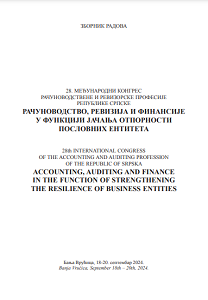ИЗВЕШТАВАЊЕ О ОДРЖИВОСТИ: ПОСЛОВНИ ЕНТИТЕТИ ИЗМЕЂУ КРАТКОРОЧНЕ РАЊИВОСТИ И ДУГОРОЧНЕ ОТПОРНОСТИ
BUSINESS ENTITIES’ SUSTAINABILITY – BASED DISCLOSURE: BETWEEN SHORT-TERM VULNERABILITY AND LONG-TERM ROBUSTNESS
Author(s): Dragan Đuričin
Subject(s): Business Economy / Management, Energy and Environmental Studies, Accounting - Business Administration
Published by: Savez računovođa i revizora Republike Srpske
Keywords: climate change; green transition; ESG metrics; sustainability-based disclosure; IFRS sustainability standards; interoperability; improved management process;
Summary/Abstract: Humankind is living in an age of bewildering change, full of conflicting signals and contradictions. On one hand, universal connectivity is an integral of the modern context, both in the economy and society. On the other hand, due to the multi-crisis that includes global warming (actually, “global boiling”), the economy and society are unable to use this new free good in full capacity. The vast majority of relevant experts believe that the “green transition” is the way to escape the current multi-crisis and to fully harness the potential of universal connectivity. The green transition impacts many areas. One of the most important at the microeconomic level is the extension of performance measurement systems to include sustainability issues based on ESG metrics, along with changes in the disclosure of relevant data. Our intention in this paper is to distill the complex endeavor of the green transition, focusing on the impact of sustainability-related disclosure based on ESG metrics. We particularly emphasize the IFRS S1 and IFRS S2 standards, not only as a means of avoiding non-compliance risks but also as a way to enhance other managerial processes, ultimately leading to improved performance for business entities. With this idea in mind, the paper is structured, along with the Introduction and Conclusion, into four parts. Part 1 is dedicated to the necessity of mapping ESG metrics to sustainability-based disclosure standards in the period of green transition. Part 2 focuses on IFRS standards for sustainability-based disclosure. Part 3 discusses the interoperability between different classes of sustainability-based disclosure standards. Part 4 proposes new managerial capabilities based on ESG metrics and sustainability-based disclosure
- Page Range: 9-34
- Page Count: 26
- Publication Year: 2024
- Language: Serbian
- Content File-PDF

